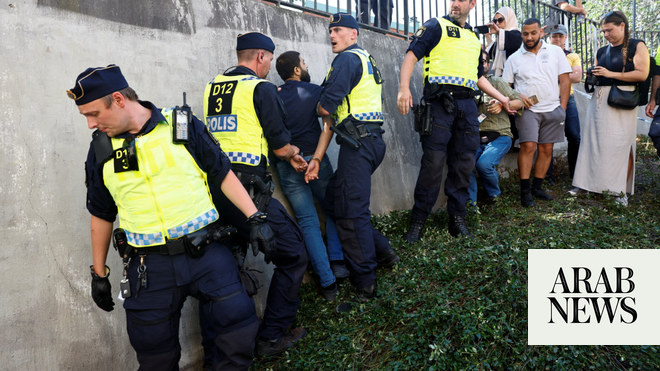
Syria appears to be on its way to resuming its former regional role, with Turkiye and other countries showing signs of re-engagement with Damascus after more than a decade of hostility.
This reminded me of the old Middle Eastern dictum: “There can be no war in the Middle East without Egypt and no peace without Syria.” The observation about Syria remains essentially true today.
To prevent a new stage of war in Syria, major diplomatic activity has been launched recently. There has been intense diplomatic traffic between Turkiye, Russia and regional countries, with mutual statements from foreign ministers, phone calls between leaders, and behind-the-scenes contacts between intelligence and military officials that are not disclosed to the public.
On Dec. 8-9, a delegation led by Alexander Lavrentyev, Russia’s special presidential envoy for Syria, visited Turkiye. It came as Turkish authorities pondered a military operation against the People’s Defense Units, also known as the YPG, which is the Syrian branch of the terrorist Kurdistan Workers’ Party, or PKK, based in northern Syria.
Moscow is also dispatching Deputy Foreign Minister Sergey Vershinin to Turkiye for political consultations on Syria. He is due to arrive in the country at the end of this week and will meet Turkish counterpart Sedat Onal, a veteran diplomat responsible for the Syria file, in Istanbul. The issues on the agenda for their talks are related not only to Syria but also the Black Sea grain-export agreement, Libya, and other regional matters, according to a statement by the ministry.
Lavrentyev recently revealed that Moscow supports the notion of hosting a meeting between Turkish President Recep Tayyip Erdogan and Syrian President Bashar Assad. Erdogan has responded fairly positively to Moscow’s desire to mediate talks between Ankara and Damascus, recently indicating that relations with Syria “could develop in the future in a similar manner to how Turkiye developed ties with Egypt.”
This statement was a clear indication that Ankara is returning to the diplomatic principle that “there are no eternal friendships or eternal enemies; there are only interests.”
If the atmosphere in Turkiye on this issue seems positive, seemingly the same cannot be said in Syria. Damascus is reportedly resisting the Russian efforts to broker a summit because Assad believes such a meeting could boost Erdogan’s chances of re-election but yield little in return for him.
Turkish sources disputed suggestions that Damascus is delaying and said that things were on track for an eventual meeting between the leaders. Russian sources said Russian President Vladimir Putin “is slowly preparing the path for this. It would be the beginning of a major change in Syria and would have very positive effects on Turkiye. Russia would benefit too … given it is stretched in many areas.”
It is no secret that Putin is playing an active role in setting up a meeting between Erdogan and Assad and pressing both sides on the issue. This is because any normalization of relations between Ankara and Damascus would reshape the decade-long Syrian war, with both regional and domestic implications for both countries.
After almost 10 years of tensions in bilateral relations, Erdogan and Egyptian President Abdel Fattah El-Sisi recently shook hands in Qatar, on the sidelines of the opening ceremony of the FIFA World Cup. This development was considered by observers to be a move toward mending fences, leading many to ponder whether Erdogan would follow a similar policy of warming ties with Assad.
Any normalization of relations between Ankara and Damascus would reshape the decade-long Syrian war.
Erdogan previously suggested he would meet with Assad when “the right time comes.” There is as yet no clear indication of where, when and under what circumstances such a meeting might take place. If and when it does, however, there will be conditions set by both sides.
Turkiye’s main condition will be to ensure that the YPG/PKK presence withdraws to the south of a line drawn 30 km from the Turkish border. Ankara, which has conducted several military operations on the ground in northern Syria in the past few years, now wants to achieve this goal without any further hard-power elements.
History is a good guide in this regard. When Turkiye and Syria came to the brink of war in late 1990s as a result of the PKK presence in Syria, Ankara and Damascus chose the diplomatic path, rather than war, to rid Syrian soil of PKK elements.
At that time, Egypt and Iran played key roles in the mediation process. Now Russia and even the US need to accept similar responsibility for helping to avoid the situation in Syria getting even worse for all involved.
The head of the Russian forces in Syria reportedly held a meeting with a Kurdish commander over threats by Turkiye to launch a new incursion. During this meeting, he asked the Kurdish militants to withdraw to the south of the 30 km line envisaged by Turkiye to prevent the launch of a ground operation.
In the move toward normalization of relations between Egypt and Turkiye, it was Qatar that took the role of the mediator; in the case of Syria and Turkiye, there seems no better mediator than Russia, which is a close ally of Damascus and an Astana Process partner to Ankara.
And what of the old dictum? Why can there be no peace without Syria? Because today, after the huge catastrophe in the country, which still has not ended, regional stability and peace continue to depend on the course of events there.
Several states — regional and global — and their proxies, as well as nonstate actors, have been involved in this lingering conflict and each party has its own stake in the possibilities for a post-war Syria.
• Sinem Cengiz is a Turkish political analyst who specializes in Turkiye’s relations with the Middle East. Twitter: @SinemCngz












